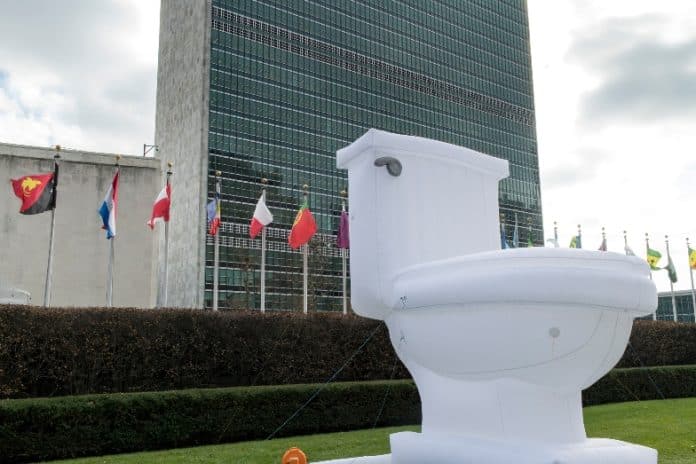World Toilet Day has been a UN observance since 2013. It raises awareness of people living without access to safely managed sanitation. Access to sanitation and drinking water is a catalyst for every aspect of sustainable development and provides critical resilience against the impacts of climate change. Here we outline eight facts as we mark World Toilet Day.
-
There are 3.5 billion people living without safe toilets
A ‘Safe Toilet’ refers to a sanitation system managed in a safe manner. This entails an exclusive toilet for a single household, which either processes or disposes of human waste on its premises, securely stores it for later removal and treatment off-site, or links to a functional sewer and treatment facility. In 2019, an estimated 2.0% of people in the European Union lived in a dwelling without its own indoor flushing toilet.
2. Lack of access can be fatal
Unsafe water, sanitation, and hygiene are responsible for the deaths of around 1,000 children under five every day. A safely managed sanitation system must take away waste and safely treat it. Otherwise, human waste can contaminate our communities, waterways and even our food, making people seriously ill.
3. Safe toilets and hygiene services allow women and girls to comfortably manage their periods
Poor menstrual hygiene caused by persisting taboos, lack of access to menstrual products, clean water, toilets and overall poor sanitation infrastructure undermines the educational opportunities, health and overall social status of women and girls around the world.
4. The effects of climate change threaten sanitation systems
The frequency of water-related disasters is on the rise due to the increase in the intensity of natural events such as storms, high winds, heavy precipitation and dry spells. Floodwater can damage toilets and spread human waste into water supplies, food crops and people’s homes.
5. World Toilet Day 2023’s theme is: ‘Accelerating Change’
It shares the same theme as World Water Day. With just seven years left, the world has to work, on average, five times faster to meet the sanitation target of SDG 6 – access to safe toilets and water for all – by 2030.

6. The hummingbird is the symbol for World Toilet Day 2023
In the age-old tale, a hummingbird endeavors to combat a massive fire by transporting tiny water droplets in her beak. Her efforts, though minuscule, contribute to addressing a significant issue. Each individual has the capacity to take action in addressing the sanitation crisis. We can all be hummingbirds!
7. The Plan of Action
The Water Action Agenda, announced at the UN 2023 Water Conference in March, combines existing and new commitments from governments, companies, organisations, and institutions to make rapid change on sanitation and water. This action plan calls on everyone to rapidly deliver on their promises.

8. Think before you flush
Almost a million adults living in Ireland continue to regularly flush wet wipes and other sanitary items down the toilet. In the United Kingdom, wet wipes are the biggest cause of sewer blockages. Domestic pipes are not designed to carry this type of waste. When blockages happen, the contents of toilets can end up in rivers and on beaches, causing pollution that kills fish and other wildlife.
At the wastewater treatment plant, sewage-related litter adds to the volume of solid matter which has to be carefully and expensively removed for landfill. Dental floss in particular should not be flushed down the toilet as it can collect in filters during the treatment process and can cause machinery to break down.
How can I help?
- Break the taboo: Start conversations about the critical connection between toilets, water and menstruation.
- Remember to only flush the three P’s: Pee, poo and toilet paper.
- Flush safe: Fix leaking water and waste pipes, empty full septic tanks and report the dumping of sludge.
- Stop polluting: Don’t put food waste, oils, medicines and chemicals down the toilet or drains.
- Call for change: Write to elected representatives about budgets for improving water and sanitation at home and abroad.




